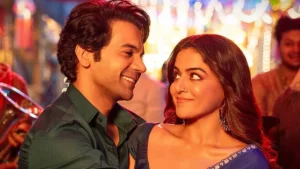
According to Mohit Suri’s Malang, this world is a bad, bad place to be in. The planet is grim, stylish and also filled with good-looking, mysterious people. The leads, as is the trend, are not shown to have family ties but are having the time of their lives in Goa’s scenic locales. They are insanely good to look at and do not seem to have bills to pay. Amid their obviously electric chemistry and the DOP’s obsession (or maybe the producer’s obligation) for excess GoPro shots, Malang is a nicely packaged thriller film despite certain Jupiter-sized loopholes and a genuine lack of coherence in terms of character motivations.
Malang opens with Inspector Anjaneya Agashe (Anil Kapoor) performing what look likes his favourite Asha Bhosle number (‘Aaj Ki Raat’ from Anamika) on karaoke in a shady Goan bar. Before we realize, an encounter happens – out of the blue – setting the mood for the rest of the film. Soon we are treated with a stylized one-take action sequence where a beefy Aditya Roy Kapur is seen beating up a fellow convict in prison only to get hold of a thread. Later through a flashback, we learn that he is Advait (Aditya Roy Kapur), a tourist from Mumbai, who stumbles upon a puzzling damsel named Sarah (Disha Patani) in Goa. The third angle in the story is the reticent cop Michael Rodrigues (Kunal Kemmu) who, besides investigating the murders of his colleagues, is also undergoing a tumultuous personal crisis.
Centred on these decidedly ambiguous characters, Malang, interestingly, is a pretty straightforward story. What makes it a tad unusual is the non-linear screenplay structure which takes several flips from present to past, dropping crucial hints which are of the kinds that an average moviegoer would easily predict. The present-day incidents take place during the Christmas eve. This is preceded by a series of murders committed by an assassin who makes sure to contact Inspector Agashe on phone before doing the deed. He also utters an intriguing line ‘Happy Solstice’ all through, making way for a suspenseful last act.
The prime issue with Suri’s film is the way precariousness surfaces way quickly in its narrative. Malang is edgy, dressy and wants to obsessively flaunt its twists and turns. However, there is only so much that one can do with a story that’s old as hills but is repackaged in a format that attempts to fool a gullible viewer. The film packs in several issues such as impotency, police violence and drug abuse while not doing full justice to any. The twists, for large parts of the film, seem forced and the one in the finale can be predicted from a distance while we also acknowledge its cheesy capriciousness. However, the film’s attempt in assigning violent quirks to some of the characters (Kemmu, Kapoor) is rather successful.
Adding to the woes is Malang’s lead pair who simply lack the skills to internalize their characters’ turmoil. Aditya Roy Kapur remains in the John Abraham mode where his abs and biceps hog the screen whereas his facial muscles remain stiff as teakwood. Disha Patani, flaunting her perfectly toned body, struggles even more with a patchily written character. The writers should have known ways to project a mysterious dreamer as an actual person instead of making her appear unnecessarily distant and detached. Kunal Kemmu does very well as the righteous cop with an eerie, unexplored side. Anil Kapoor is even better as he fills the screen with his trademark badassery every time he makes an appearance. Aghashe’s part also gives him ample scope to be emotional and empathetic – all of which Kapoor magically pulls off, lending human shades to the unlikeable cop. There is also Elli Avram in a crucial supporting role. Whilst she does well, the character is extra-catalytic in nature to leave much of an impact. Ditto for Shaad Randhawa who appears in a shoddily-penned, overtly tell-tale scene which is inserted solely to drive home a simple point.
Malang, much like Mohit Suri’s previous outings, is rich in a soundtrack that runs throughout. While the songs do not entirely qualify to be termed melodious or chart-busting, ‘Humraah’ and the title track match the film’s trippy tenor. While the placement of songs initially feels forced, Suri eventually displays his trademark intensity with ‘Chal Ghar Chalen’. The entire film, in some way or the other, feels like an extended version of a music video album, visualized through Vikas Sivaraman’s indulgent lenses. Problems arise only when Malang attempts to be a full-fledged feature film because there is only so much one can do with a lacklustre screenplay and characters lacking in solid arcs and beating hearts.
Rating: ★★ 1/2
Malang is now streaming on Netflix.

